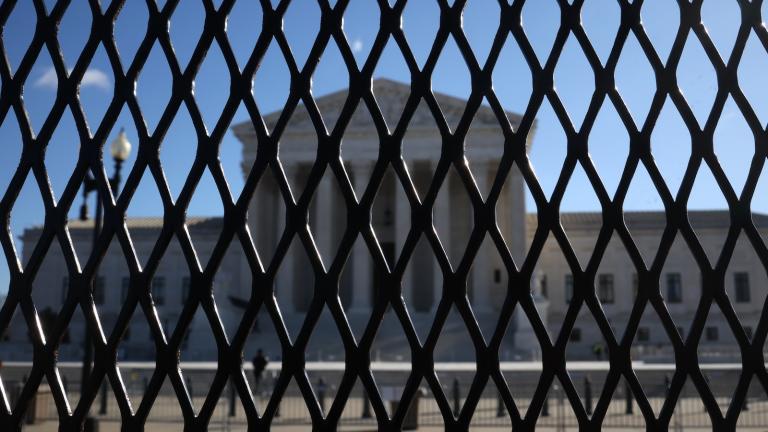I’ve been to climate meetings in locales that stretch from Kyoto to The Hague, Mexico City to the Maldives. It would have been awfully easy to get in the old hybrid and drive two hours north to Montreal for the big climate-change confab that wrapped up this weekend — if nothing else, it’s a city I love deeply. But I couldn’t bring myself to do it in the end. I knew it was going to be too painful to watch.

Do U.S. see what I see?
Photo: iStockphoto.
Too painful because, as it has since the issue first emerged, the United States was the one blocking progress. Thirteen long years ago, in 1992, as he was setting out for the Rio de Janeiro summit that launched the international negotiations on global warming, the first President Bush announced that he might be willing to talk about such things, but “the American way of life is not up for negotiation.” That was tragedy; by now it’s descended into farce. Our representative — yours and mine, the person speaking for the country of Thoreau and Muir and Carson and Brower — is a man named Harlan Watson. If he had merely spent his time explaining why America would never join the Kyoto Protocol, that would have been one thing — our non-participation has been a given ever since Bill Clinton and Al Gore decided it wasn’t worth staking any political capital on. But instead, he’s concentrated his efforts on making sure that there won’t be constructive talks about what comes after Kyoto when it expires in 2012. In effect, he’s trying to make sure that the second George Bush’s refusal to countenance any discussion of limiting carbon in the atmosphere lasts long after his term in office finally, blessedly drags to an end. Even then, they’ve succeeded in setting the bar so incredibly low that the most dismal deal — some Kyoto-lite exemption-filled utility-blessed legislation — will seem like manna, and we will eat it up.
Too painful because in the process this same Harlan Watson has demonstrated once more the corporate headlock on our government. How did our representative get his job? We now know, because of a fax that was sent in February of 2001, two weeks after Bush’s first inauguration, from the “senior environmental adviser” at ExxonMobil to the White House. This adviser outlines a number of steps the White House should take immediately, including engineering the firing of a scientist named Robert Watson (no relation to Harlan, in many, many ways) as the head of the Intergovernmental Panel on Climate Change. It also recommends transferring Harlan from his work under House Speaker Dennis Hastert (R-Ill.) to the climate-change team. And of course, this is what happened. Did this revelation shame ExxonMobil? It did not. A spokesperson said, “As the largest energy company in the U.S., [we are] frequently asked by government officials to comment on substantive issues. We take that responsibility seriously.” And did this revelation startle anyone else? No, of course it didn’t. Five years into the Bush administration, we all but take it for granted that this is how it works.
Too painful because these are the years when we desperately need to be making progress. Eventually even we will have no choice but to start doing something about climate change. But each new issue of Science and Nature makes it clear that the important time is now — that the climatic tipping point is nearer than we thought. More to the point, each passing year brings China and India further along their development path, using precisely the same raw material — coal — that we used to build our wealth. Five years ago, with incredible effort and investment, we might have nudged that trajectory in a very different direction; but last year, China added 65 gigawatts to its electric grid, twice as much as all of New England. And as that happens, the U.S. and China become each other’s perfect excuse for inaction. “We won’t do anything until China does.” “How can we be expected to do anything if the U.S. won’t even act?” Carbon dependent and co-dependent.
Too painful, finally, because there are so many fine young people who have worked so hard. A few weeks before Montreal, I went to a gathering of 50 or 60 students at Middlebury College near my home. They call themselves the Sunday Night Group, and they get together (on Sunday nights!) to work on climate change. Some of them work on organizing at churches, and some of them work on handing out compact fluorescent bulbs, and some of them work on biomass boilers, and on and on. They are tireless, devoted, and far less ego-driven than the student organizers of my college days. And there are more like them on campuses around the continent — a loose-knit group called Energy Action has emerged as their umbrella. It’s the most impressive engagement by young people with environmental issues since the first Earth Day. It’s just that they have the bad luck to be coming of age at the moment when environmentalism — an American invention, our great gift to the modern world — has become painfully difficult work in this country. America is not the engine of environmental progress. It’s not even the caboose. It’s the anchor hanging off the caboose. And it is painful, damn it, to see those young people run head-on into all of that.
But run they did, and powerfully. Before the conference ended, they’d joined with students from around the continent to march in the largest rally yet against global warming. They’d serenaded conference delegates and handed out cans of Spam and lifejackets (“climate-change survival packs”). They’d networked and Palm-Piloted and built organization. They’d let Harlan Exxon Watson know that they knew he was the lamest sort of tool. I kind of wish I’d been there to see it. I guess next time I’ll have to go.



